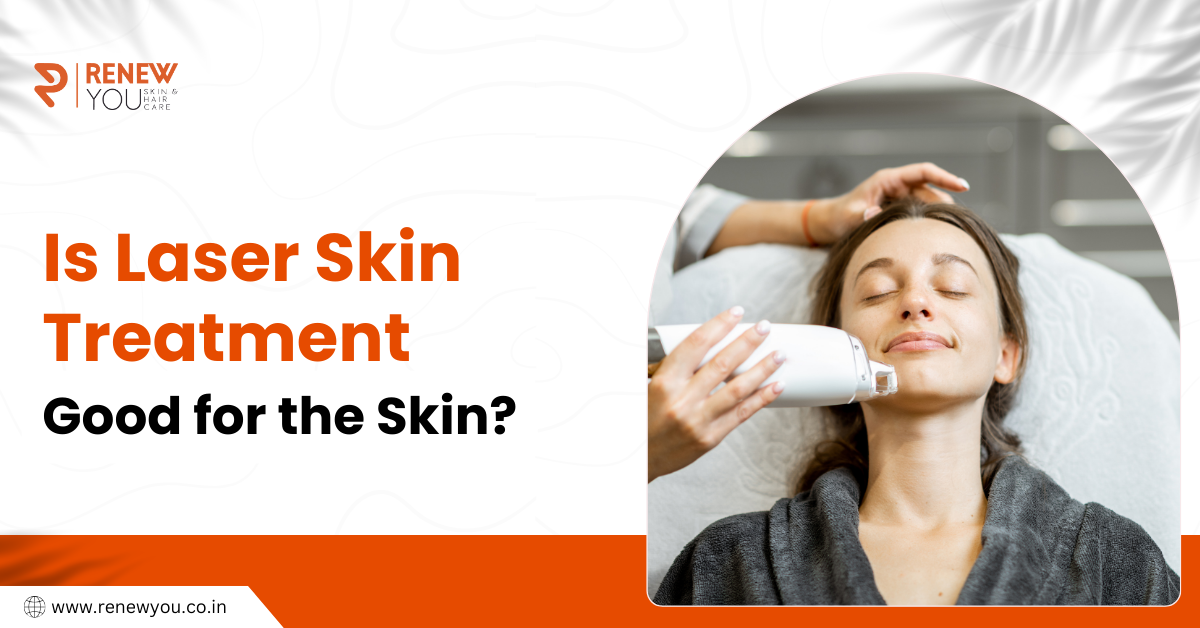Laser skin resurfacing may help your skin appear younger and healthier if age, acne, or too much time in the sun has left your face with blotches, scars, wrinkles, or lines.
Laser skin resurfacing, sometimes referred to as laser peel or laser vaporization, laser surgery precisely removes skin layers. The tightened, younger-looking surface of the new skin cells created during healing gives the skin. One can do the operation either alone or in conjunction with other facial cosmetic operations.
A laser can seem like a magic wand able to vanish any scar. But medical lasers are not toys to play with. At the Renew You clinic, you’ll receive the best laser skin treatment in Panchkula. Before you get laser therapy for a scar, be sure you know these fundamental facts to avoid major side effects and receive amazing results.
Facts you should consider before going for laser treatment
1. Cannot eliminate a scar with laser treatment.
Recent medical advances have made lasers the preferred treatment for many scars among dermatologists. Laser therapy can:
- Stop a raised scar from developing following surgery.
- Minimize scar discomfort and itching.
- If a scar restricts movements, extend your range of motion.
- Although it cannot completely remove a scar, laser treatment can help make one less obvious. During laser scar therapy, one scar is replaced with another less obvious scar.
2. The quality of the person performing the laser treatment determines most of the outcome.
Dermatologists are the leading authorities on laser scar treatment and research.
- Laser treatment can effectively heal a variety of scars when administered by a board-certified dermatologist.
- Laser treatment may not produce the desired outcomes if the individual doing your laser treatment lacks medical understanding and specific skin expertise. It can even be harmful.
3. A medical consultation is absolutely vital before any laser therapy.
Do not trust anyone who assures you of treating your scar before offering a medical consultation.
List the drugs and supplements you use with your dermatologist. You should stop taking anything temporarily if you want to heal properly and avoid the laser from scarring your skin.
Tell your dermatologist at the medical consultation whether you:
- Get sores from chilly temperatures.
- Share any medical condition, including diabetes.
- Smokes
- Use any pills or supplements.
- Your dermatologist also has to be aware of your expected outcomes from treatment. Speak truthfully.
4. Both before and after laser treatment, sun protection is absolutely vital.
Your dermatologist cannot treat you should you come up for laser therapy with tan or sunburn. Using a laser could burn your skin severely or discolor it.
You will have to cover your skin from the sun until it recovers following laser treatment. Should the dangerous rays of the sun strike your treated skin, you may still get another scar.
5. Before therapy, you might have to modify your lifestyle somewhat.
Dermatologists advise patients to recuperate properly and maximize the outcomes following laser treatment by:
- Give up smoking for a minimum of two weeks prior to laser therapy.
- Cut off using aspirin, vitamin E, and other drugs and supplements that might slow down healing.
- For two to four weeks, stop using skin care products, including glycolic acid or retinoids.
- If you often get cold sores, take medicine to stop them from growing.
- Steer clear of the sunlamp, tanning bed, or sunbeam. Having a tan or sunburn renders you unable to be cured.
6. Your course of therapy can call for more than just laser work.
Dermatologists frequently treat scars using many treatments in order to provide patients with the greatest outcomes. For instance, a dermatologist might repair deep acne scars a patient has using a laser. The patient might also get filler.
7. You could need more than one laser treatment.
A dermatologist may organize a series of laser treatments to provide a patient with long-lasting effects and the most progress. Using a type of laser known as a non-ablative laser often calls for this. With this laser, you won’t have downtime, but you could require several laser treatments to get the intended results.
8. You will have to take care of the laser-treated region at home.
Following the advice of your dermatologist for at-home maintenance following laser treatment can help you obtain the greatest results and avoid any possible adverse effects.
9. Results show their presence slowly.
The effects of laser scar treatment may only show for a short time, and initially, you might not observe any improvement.
10. Insurance might not pay for it.
Laser scar therapy might help with the pain and itching sometimes brought on by scars. Laser therapy might help you move more freely if a scar restricts movement. Still, insurance companies view laser procedures as cosmetic treatments. Generally speaking, health insurance does not pay for cosmetic procedures.
In Bottom line
If you are contemplating laser scar therapy, see a board-certified dermatologist to be sure it is appropriate for you. Renew Your Clinic offers the best laser skin treatment in Panchkula. Our staff will never let you down; many of them have years of expertise in HIFU treatment. We make sure the client gets the greatest potential outcomes from the operation and goes through the least trouble during it.



